Effective communication is crucial in the business world, and having a strong grasp of business vocabulary can help you convey your ideas clearly and confidently. Whether you are in a meeting, writing a report, or networking with colleagues, using the right business terms can enhance your professionalism and credibility.
Below are some examples of common business vocabulary that you may encounter in the workplace:
1. Key Performance Indicators (KPIs)
KPIs are measurable values that demonstrate how effectively a company is achieving its key business objectives. Examples of KPIs include revenue growth, customer satisfaction, and employee turnover rate.
2. Stakeholders
Stakeholders are individuals or groups who have an interest in the success of a company. This can include employees, customers, investors, and suppliers. It is important to consider the needs and concerns of all stakeholders when making business decisions.
3. Return on Investment (ROI)
ROI is a measure used to evaluate the efficiency or profitability of an investment. It is calculated by dividing the net profit of an investment by the initial cost of the investment, and is often expressed as a percentage.
4. Market Segmentation
Market segmentation is the process of dividing a target market into smaller, more defined segments based on demographics, behavior, or other factors. This allows businesses to tailor their products and marketing strategies to specific customer groups.
5. SWOT Analysis
SWOT analysis is a strategic planning tool used to identify the Strengths, Weaknesses, Opportunities, and Threats of a business. By assessing these factors, companies can develop strategies to maximize their strengths and minimize their weaknesses.
By incorporating these and other business vocabulary terms into your daily communication, you can enhance your professional image and better navigate the complexities of the business world. Remember to adapt your language and tone to your audience, and always strive for clear and concise communication.
In conclusion, mastering business vocabulary is essential for success in the modern workplace. By expanding your knowledge of key terms and concepts, you can improve your communication skills, build stronger relationships with colleagues and clients, and ultimately, advance your career in the business world.
